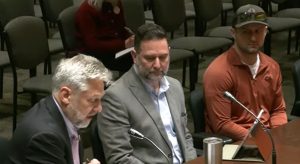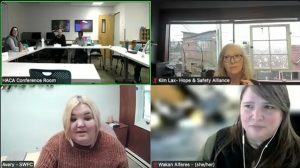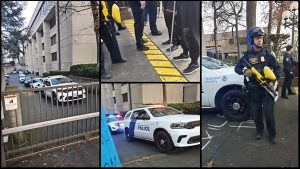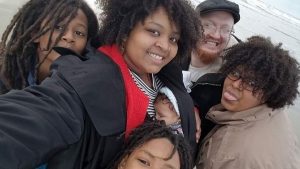Northeast priorities: Arterial bridge, Coburg congestion, more bus service
7 min read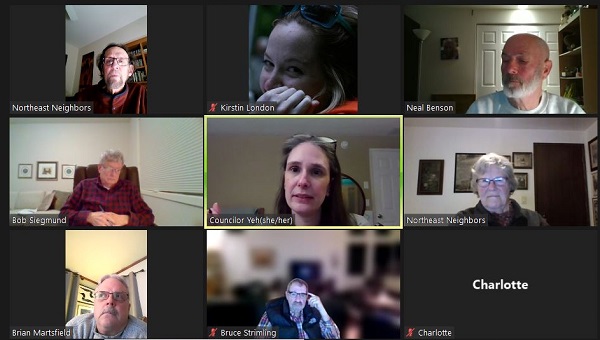
Northeast Neighbors offer the neighborhood’s priorities for 2023. Speaking during the board meeting Jan. 2:
[00:00:08] John Faville (Northeast Neighbors): Our stated number one priority and our primary focus of energies is the arterial bridge. One of our main roles is that of nudging people and within the city pushing for its priority within staff. The thing that they’re focused on now is not even the funding, but it’s all sorts of land use issues because it goes through a section that is mix of county and city property. And there’s some UGB (urban growth boundary) issues in there.
[00:00:38] A continuing priority for us is Coburg Road on both sides of the Beltline—constant issues about how congested it is. And the city has done a lot in terms of fine-tuning the lights there and working on protected lefts and so on and so forth. But I’m told the real solution will be widening Coburg going under the Beltline, and that’s a big solution.
[00:01:07] Anne Milhollen (Northeast Neighbors): We have a whole lot of growth on the north side and because of Ayres (Road) being apparently too difficult to navigate for a bus to go, I would really like somebody to brainstorm how they could get a little more service into these new neighborhoods.
[00:01:27] I actually would enjoy bringing back the LTD folks and talk to somebody who is sort of creative about the whole idea of how you could bring more service up here.
[00:01:42] Kirstin London (Northeast Neighbors): Yes, we need more LTD services. I can’t tell you how many times I’ve seen somebody on the Lane County Mutual Aid Facebook page state that they need an Uber fare to get to the Walmart from the new apartments, because there isn’t a bus route, and how much that eats into their food budget.
[00:02:04] Brian Martsfield (Northeast Neighbors): Living in Lakeridge, there’s a lot of concern here about all the added traffic down there, and basically zero buses. And I liked the idea, I think it was (from) one of the LTD people that, you know, maybe a van or something because they can’t get a bus down Ayres (Road). And it’s getting interesting getting in and out of Lakeridge these days.
[00:02:27] I really agree with Anne, people just aren’t going to drive down and park their car at Home Depot and try to catch the one bus that comes down Crescent. It’s rough.
[00:02:38] John Q: The top priorities from Northeast Neighbors for 2023.
[00:02:43] John Faville: Another of our priorities, getting our budget to do the outreach. We’ve heard that there is severe pressure on budgets next year and even the thought of a 10% reduction across budgets.
[00:02:58] Councilor Jennifer Yeh: I can tell you the budget will be tight for the next several years. It’s not just this year, but for several years. We lost a lot of money during COVID. We’re spending reserves, basically, right now, even with the cuts. And then it didn’t help that we lost money through Comcast.
[00:03:15] But I will say I haven’t heard any rumors about money getting cut from neighborhood services. In the scope of things, neighborhoods really don’t get that much money, right? When you think about the city budget overall, and how much each individual neighborhood gets, it’s really not that big.
[00:03:30] So, my argument would be that this is a very small investment for a large return. And I think there’s enough folks who see value in the neighborhood association on the Budget Committee. I think you guys have really good examples of what the neighborhood association has specifically been able to accomplish.
[00:03:49] So I’ll keep you guys in the loop. If people are eyeing your budget, I will keep you informed. It’s not the best place to cut. You lose a lot in engagement for the small amount you gain.
[00:03:59] John Faville: Good. Boy, we all agree. Next one I want to mention is homelessness and the whole broad range of issues there. Kirsten (London) put together a terrific meeting about a year ago that was about Safe Sleep Sites across various sites in the city and very well-attended. But on the other hand, I’ve got to tell you, there is a very widespread-through-the-area desire not to have the problems that affect other neighborhoods. We’re all pushing for solutions, but also not wanting the problems.
[00:04:31] Councilor Jennifer Yeh: I think a lot of our compassion is wearing thin and the garbage and the crimes and the problems, like, I get it. We all live in the same community. I work at the fairgrounds. It’s hard to continue to be positive and to be compassionate—100%, I get it.
[00:04:48] It has been frustrating, but I think there’s some hope on the horizon. We’re really positive about some potential funding from the federal government that the city’s been working really hard to advocate for it to come straight to cities.
[00:05:03] And some of them would also go to places like CAHOOTS. Right now, the funding from the federal government is planned to go to the county and not to us. And so we’re trying to advocate, ‘Hey, we want the money directly.’
[00:05:14] Our community has a really strong case for needing it, and our own examples of, ‘Look, we’ve done great things, but we need to expand them. And we need money for that.’ Our community’s not rich. We can’t afford to pay for the volume that we have here.
[00:05:31] Kirstin London: I’m interested in middle housing and what we’re doing to help alleviate our housing shortage supply and the impact. It’s great that we’re looking at funding and I think it’s great that you’re talking about ways to ensure that the most funding gets to the people it’s meant to serve. And at the same time, we’re going to continue to see an increase in our unhoused population if we don’t really do some focused work around our housing supply issues.
[00:06:01] Councilor Jennifer Yeh: I think you make a really good point. It has been a little discouraging, I think, recently, for new housing developments. There was a planned low-income subsidized facility that was going to be going in in North Eugene, from Cornerstone (Community Housing). And it looks like because of all the inflation issues, their funding is not going to be sufficient, that that facility is not going to be built anymore. So that’s going to be a challenge.
[00:06:25] And we’ve done a lot of changes the past couple years in how we use our land use code, right, to make it easier for middle housing and smaller housing types. It’s not one of those things that happens overnight, so we’re going to have to wait and see how things go. Hopefully it will make an impact over the long run.
[00:06:44] Also, in that area, there’s a whole new set of land use changes that has been mandated by the state. We’re looking at parking right now, but there’s going to be other parts to it that will affect other parts of our housing.
[00:06:59] John Faville: It’ll very heavily affect Harlow, but we have only a little bit of Coburg that brings the parking. And then frankly, we are developed. I mean there’s very little space up here that isn’t owned either by—there’s a lot of open space—but it’s owned either by First Baptist or the Wildish Corporation. And so we might not be seeing a lot of development in this neighborhood.
[00:07:26] Next item on the list, Striker (Field Community Park), you know this. (Striker!) You know, and (John) Jaworski was working on it when it was still part of, when he was still with Cal Young. I mean, he has been advocating for it for, he was, 15 years ago and so this is, and then, hey, so it’s been a long, long, long, long process. (Yes.)
Still unclear when it’s going to open and when we do get that committee up and running , that is going to be very consuming and very much a priority for us.
[00:07:54] Councilor Jennifer Yeh: Yeah, it’s a big deal. It’s the longest-undeveloped park in the city.
[00:07:58] John Faville: And then I want to mention one more priority, board reach. Because you look around, and by and large, we’re older, retired, and homeowners, by and large. Within NEN 40% of the addresses are rentals across the area and getting a renter on the board, that’s very much on our mind as we look around and try to think about our priorities.
And we try to be very cognizant of our limited representativeness. We think very hard about the points of view of the people who aren’t on the board and how we can represent them within meetings and within the communications. But it’s just something that’s just frustrating as a board to realize we aren’t going to look like the community.
[00:08:46] John Q: Northeast Neighbors is represented by Councilor Yeh and Councilor Mike Clark.
[00:08:53] John Faville: I want to mention, Jennifer, how terrific it is to have both you and Mike, because it means we’re always well represented on both sides of every issue (laughter).
[00:09:03] Councilor Jennifer Yeh: (Laughing) I guess that’s true, right?
[00:09:05] John Q: Northeast Neighbors share their 2023 priorities with Councilor Jennifer Yeh. The board is working on the arterial bridge, a fix for Coburg Road congestion, and more bus service to the neighborhood.

